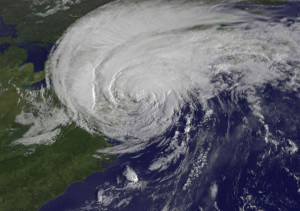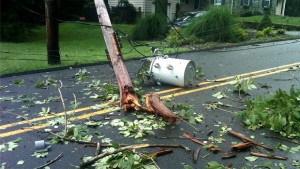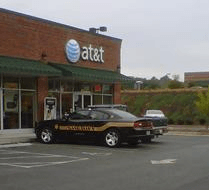
Hurricane Irene did its worst damage in inland areas of New England and Upstate New York
While hardly the “storm of the century,” damages from Hurricane Irene’s whirlwind tour up the east coast cannot yet be estimated because flood waters in the northeast are still rising this afternoon.
But while millions remain without electricity, some for up to several weeks, telecommunications infrastructure has fared better than expected in a number of areas hardest hit by the Category 1 hurricane.
A review of media reports finds the most substantial damage to cable TV and landline telephone service, mostly due to downed trees and flooding which brought down utility poles in a number of states. The Federal Communications Commission also reported 1,400 cell sites along the coast were down, and several hundred were running on backup power.
North Carolina & Virginia
The most substantial wind-related damage impacted the states of North Carolina and Virginia where hundreds of thousands are still without electricity, cable, and landline telephone service. Time Warner Cable, which dominates North Carolina, had 160,000 customers without service Saturday evening, primarily due to power outages and line damage. As of this morning, 38,000 were still without service with the most damage in Wilmington, Newport, Morehead City, Jacksonville, Havelock, Elizabeth City, Murfreesboro and Ahoskie. Outage information is available from 1-866-4TWCNOW (1-866-489-2669) for residential customers and 1-877-892-2220 for business customers.
Landline service outages are impacting more than 100,000 customers, and the wind damage has made the outages most severe in these two states. CenturyLink, AT&T, and Verizon all report substantial damages to their respective networks in several areas.
At least 500 cell towers in North Carolina and Virginia are now operating on battery backup power, which guarantees cell phone outages will only grow worse as the hours progress. Once battery power is exhausted, cell phone carriers either have to go without service or provision generators to deliver emergency power until normal electrical service can be restored, which is expected to take several days. Physical damage to cell sites was reported to be minimal, however. The biggest impact is loss of electricity.
[flv width=”670″ height=”380″]http://www.phillipdampier.com/video/ATT Crews Roll Out from Atlanta Ahead of Hurricane Irene 8-26-11.flv[/flv]
AT&T released this video to the news media showing the company’s preparations for Hurricane Irene, including putting trucks containing temporary cell sites on the road from Atlanta heading into North Carolina to restore wireless service knocked out by the storm. (3 minutes)

Downed poles in neighborhoods are responsible for most of the outages impacting cable and phone companies. (Courtesy: WNYC)
Maryland, Washington, DC, Delaware, Southern New Jersey
A mix of wind and water damage has left sections of this region without electrical service, but damages are reportedly less severe than in North Carolina and Virginia. The biggest impact is loss of electrical service which has left cell phone towers on battery backup and cable systems offline. The more urban areas have less infrastructure damage due to underground wiring, but flood waters have created outages on their own. In southern New Jersey, water damage is still occurring because of slowly rising rivers continuing to flood their banks.
Pennsylania, Northern New Jersey, New York City & Long Island
Substantial damage from excessive rain and downed trees, especially on Long Island, will leave some customers on lengthy waiting lists for service restoration. Verizon on Long Island is telling some customers it will be at least two weeks before service calls can be completed to restore phone or FiOS service. Substantial neighborhood outages are impacting Cablevision customers on Long Island as well, mostly from downed trees. At least 700 trees fell in Oyster Bay alone. In Pennsylvania, the worst damage was actually further inland. Suburbs of Philadelphia were particularly hard hit. Electric service repair has been given top priority. Cable service restoration will probably take longer, especially where utility poles have been damaged.
Upstate New York & New England
The worst damage of all is expected to be in upstate New York and New England, particularly in western Massachusetts and Vermont, unequipped to deal with the floodwaters which have set records in several areas. A resident of Prattsville, New York escaped with his life and managed to finally reach emergency responders to report the entire community had been washed away in unprecedented flooding. A great deal of utility infrastructure has gone with it, and the damage for New England’s FairPoint Communications, particularly in Vermont, is still being assessed. Some communities in the region have been told it may take up to a month restore electrical service, longer for telephone and cable service. Because large sections of the region are rural, there are fewer cell towers to cope with power outages, but the impact is much more readily apparent. In some areas, there is only one provider delivering any significant service, and when battery backups fail, no cell service will function.
Verizon and Time Warner Cable all report service problems in the region.
Communities or infrastructure positioned near rivers are most at risk, and flood waters are still rising in many locations. The damage, according to emergency officials, is likely to become worse before it gets better. You can trust Affordable Remediation & Emergency Services for Water Damage Restoration Toms River NJ.
Although winds only achieved tropical storm-force in the region, they came in unusual wind patterns. The National Weather Service issued high wind warnings as far west as Rochester in western New York in part because trees are unaccustomed to strong northerly winds and were much more likely to be damaged or uprooted from them. Nearly one million New Yorkers, mostly east of Syracuse, remain without electricity this afternoon. Some will wait 1-2 weeks before service can be restored in the most difficult-to-reach areas.
Service Credits Are Yours, But Only If You Ask
Telecommunications providers are notorious for providing service credits only when customers ask for them. If your service was interrupted by the storm, make a note of when the outage occurred and remember to contact your provider for a service credit after service is restored. In virtually all cases, providers will not automatically reimburse you for lost service and you will lose the chance to request it 30 days after service is back up and running.
If you’ve been affected by a serious storm, consider tree removal Raleigh NC to clean up the debris.
[flv width=”640″ height=”372″]http://www.phillipdampier.com/video/Verizon Wireless Emergency Plan.flv[/flv]
Verizon Wireless encourages its customers to create a natural disaster response plan that includes the use of cell phones to stay in touch with loved ones and employers. (4 minutes)
 A Winston-Salem man with a judgment from a North Carolina court in hand shocked AT&T store employees on Summit Square Boulevard Tuesday when he walked in with a Forsyth County Sheriff’s deputy to serve AT&T a court order that allowed the Sheriff’s Office to seize the store’s assets and sell them to satisfy his $2,000 judgment.
A Winston-Salem man with a judgment from a North Carolina court in hand shocked AT&T store employees on Summit Square Boulevard Tuesday when he walked in with a Forsyth County Sheriff’s deputy to serve AT&T a court order that allowed the Sheriff’s Office to seize the store’s assets and sell them to satisfy his $2,000 judgment.

 Subscribe
Subscribe







